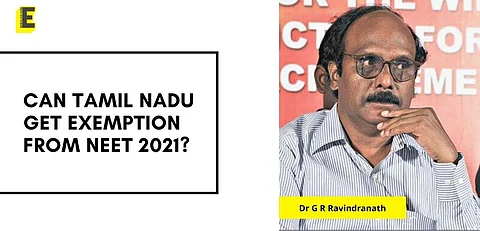

Tamil Nadu's aversion to the National Eligibility cum Entrance Test (NEET) is no news. The state has been actively campaigning against the entrance examination since its inception. However, is it possible for the state alone to boycott the exam? Legally, now that the Supreme Court has insisted on all states following its order in implementing NEET, experts say that there is little that they can do.
Doctor and social rights activist Dr G R Ravindranath, who was a member of the state government-appointed committee to study the impact of NEET on medical admissions in Tamil Nadu says that there are provisions to get it done. "It will be possible if we amend the National Medical Commission Act. Otherwise, the Tamil Nadu government can pass a separate act for UG and PG courses for getting exemption from NEET. It should be then accepted by the governor and the president. The union government must accept it," he says, adding that all political parties, especially the BJP must cooperate for this to happen.
Is it a realistic scenario? That's anybody's guess.
The committee, headed by retired judge AK Rajan, had submitted its report to Tamil Nadu Chief Minister MK Stalin last week. Prior to this, a senior BJP leader had moved the Madras High Court asking for the committee and its findings to be declared null and void as it went against the Supreme Court's ruling on NEET. However, the Madras HC tossed the case out and ruled that the committee was constitutional.
Ravindranath, who is also associated with the Doctors Association for Social Equality (DASE), a Tamil Nadu-based organisation for the rights of doctors and medical students says that medical education must remain a state subject, like health. "Unfortunately, it comes in the concurrent list. Every state should be able to make decisions on medical education, according to their necessity," he says.
The Dravida Munnetra Kazhagam (DMK), in its election manifesto, had said that it will fight against NEET if voted to power. Before submitting the report, Rajan said that the admission of rural students before the introduction of NEET and its status after the introduction of NEET is part of the report. Adding to this, Ravindranath said, "We have to find a proper way to help students from government schools, poor and rural backgrounds are not affected. For this, we have to make the necessary arrangements. The government school students already have a 7.5 per cent reservation, introduced by the previous AIADMK government. All parties supported that. Following this, students educated in government schools got to join medical and dental colleges. This was historic."
He added that the priority must be to now reserve 20 per cent of medical seats for students who are educated in Tamil medium schools. "Students belonging to the most oppressed classes attend Tamil medium schools. Also, the latest government data shows that the number of students joining Tamil medium schools has come down. This reservation will also help in protecting the Tamil language, culture and nationality," he says, adding that there have to be reservations also for students from remote and hilly areas.
